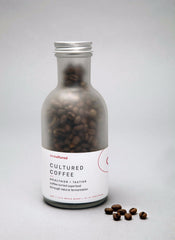Fermentation Innovation: Top Trends
At eatCultured, we're passionate about fermentation innovation. In this post we explore some of the top trends in the field today, including what makes our own innovation so special.
A New Understanding of Fermentation

As a natural process, fermentation has been used for millennia in every human culture to make food and beverages more digestible, rich in nutrients and flavor.
As a result, foods like sauerkraut or kombucha, produced via spontaneous natural fermentation, are still common place food items all over the world.
However the specific nutritional and flavor profile of each of these products is still not well understood. In addition, the levels of fermentation in these products can fluctuate significantly from one jar or batch to the next. These differences are tied to changes in everything from the climate to the chemical composition the raw ingredients (such as raw cabbage or tea leaves) used to make the food products.
To address these problems and further our understanding of fermentation, a new generation of innovators, including eatCultured's own Camille Delebecque, are applying a range of new technology and techniques. Their goal is not only standardize the fermentation process but also evolve our understanding of the core principles and processes of fermentation itself.
Healthier Food
Today's fermentation innovators are changing the food we eat either by crafting entirely new fermented foods or adding fermentation to typically unfermented foods.
(Smart) Fermented Coffee

At eatCultured, for example, we work in partnership with microbes and modern technology to craft Cultured Coffee, the first coffee made with smart fermentation.
While coffee beans can undergo a certain amount of natural fermentation after they've been harvested, smart fermentation adds additional fermentation benefits to every bean.
The process entails studying the role of individual microbes and the health and flavor benefits they can bring to coffee. The fermentation process is then carefully controlled to ensure the maximum level of health benefits in every batch.
The result is a whole bean coffee that's consistently easier to digest, provides more sustained energy and has a more mellow flavor - all thanks to natural microbes and modern technology.
Probiotic Chips
Fermentation's positive impact on digestion and the microbiome is being applied to common food products in new ways too.
For example, sauerkraut makers are now branching out into shelf-stable products like probiotic chips. At the other end of the scale, large CPG companies are adding probiotics to their regular chips. The addition of probiotic cultures can add additional flavors to chips as well as supporting healthy digestion.
Probiotic Fruit Juice
Fruit juice, either in the form of smoothies or pressed fruit juice, can now be found with added probiotics. From well-known juice brands to coconut water companies, it seems every fruit company is looking to boost the health profile of their products with added cultures.
Fermented Cooking Oil
Several biotech startups now produce healthy and more sustainable cooking oils by growing algae in commercial fermenters.
The fermentation technology provides a commercially-viable way to cultivate algae at scale indoors without the need for land, livestock or chemicals required to grow other crops.
Made by Microbes

While some food makers are using fermentation technology to make existing foods more nutritious or sustainable, another community of startups is using the principles of fermentation, namely cellular agriculture, to craft foods made entirely by microbes.
By cultivating and supporting the work of yeasts and other microorganisms using commercial fermentation technology, these startups are making everything from dairy-free milk and vegan gelatin to meatless meat, lab-grown leather and clothing.
Aside from presenting ethical alternatives for vegans and vegetarians, these new products are being engineered to offer the same flavor, nutrition or raw material as traditional options without the need for factory farming, chemicals or other unwanted bi-products.
All that's required is a thorough understanding of biotechnology and ways to scale the technology to reduce the costs of producing these alternatives. The rest is up to the consumer to determine the popularity - and commercial viability - of these new products.
Addressing Food Waste

Food waste is a global problem. Each year, billions of tons of food end up as landfill in the United States alone. At the same time, millions of people across the world are starving. Clearly, something has to change.
While tackling food waste is a complex undertaking, fermentation innovation provides one way to address the problem by recycling waste that's still nutritious back into the food chain.
Afineur, the innovating team behind eatCultured, is working hard to address this problem through a few form of cultured protein derived from spent grain. Other innovators are making beverages from upcycled grain or so-called "ugly" produce that would otherwise be thrown away.
In this area too, fermentation innovation is not only setting a new food trend based on promoting healthier foods, it's also paving the way for a new movement designed to re-engineer the food system itself for the better.
We're excited to be part of that movement and hope you'll join us on a journey to bring positive change to our food system today. 
Learn more about eatCultured's first innovative food product: Cultured Coffee.

Leave a comment
Please note, comments must be approved before they are published